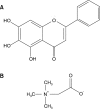Modulation of Colitis-associated Colon Tumorigenesis by Baicalein and Betaine
- PMID: 25337584
- PMCID: PMC4189507
- DOI: 10.15430/JCP.2014.19.3.153
Modulation of Colitis-associated Colon Tumorigenesis by Baicalein and Betaine
Abstract
In this review, we will summarize the current understanding of modulation of colitis-associated colon tumorigenesis by two natural products, baicalein and betaine, which have anti-inflammatory activities. Baicalein and betaine have been shown to provide various health benefits to organism in many ways. Baicalein is a phenolic flavonoid derived originally from the root of Scutellaria baicalensis Georgi. From ancient times, baicalein has widely been used in oriental medicines as an anti-inflammatory and anti-cancer therapy. Betaine, trimethylglycine, is an essential biochemical molecule of the methionine/homocysteine cycle and is synthesized by conversion of choline. Betaine is an important human nutrient obtained from various foods including sugar beet and lycium. Betaine has provided various health benefits including disease prevention. However, the action mechanisms of their activity remain poorly understood. Recent studies reported the effects of baicalein and betaine on cytotoxicity against colon cancer cells and chemically induced colitis-associated colon tumorigenesis in mice. Administrations of baicalein and betaine containing diets significantly inhibited the incidence of tumors and hyperplasia with down-regulation of inflammation. Therefore, baicalein and betaine might be applicable to the prevention of inflammation-associated colon carcinogenesis.
Keywords: Azoxymethane/dextran sodium sulfate model; Baicalein; Betaine; Colon cancer; Inflammatory bowel disease.
Figures


Similar articles
-
Baicalein, an active component of Scutellaria baicalensis Georgi, induces apoptosis in human colon cancer cells and prevents AOM/DSS-induced colon cancer in mice.Int J Oncol. 2013 Nov;43(5):1652-8. doi: 10.3892/ijo.2013.2086. Epub 2013 Sep 4. Int J Oncol. 2013. PMID: 24008356
-
Anti-inflammatory effects of betaine on AOM/DSS‑induced colon tumorigenesis in ICR male mice.Int J Oncol. 2014 Sep;45(3):1250-6. doi: 10.3892/ijo.2014.2515. Epub 2014 Jun 24. Int J Oncol. 2014. PMID: 24969167
-
Baicalein Inhibits Dextran Sulfate Sodium-induced Mouse Colitis.J Cancer Prev. 2019 Jun;24(2):129-138. doi: 10.15430/JCP.2019.24.2.129. Epub 2019 Jun 30. J Cancer Prev. 2019. PMID: 31360692 Free PMC article.
-
Biological properties of baicalein in cardiovascular system.Curr Drug Targets Cardiovasc Haematol Disord. 2005 Apr;5(2):177-84. doi: 10.2174/1568006043586206. Curr Drug Targets Cardiovasc Haematol Disord. 2005. PMID: 15853750 Review.
-
Exploring baicalein: A natural flavonoid for enhancing cancer prevention and treatment.Heliyon. 2024 Nov 28;10(23):e40809. doi: 10.1016/j.heliyon.2024.e40809. eCollection 2024 Dec 15. Heliyon. 2024. PMID: 39691196 Free PMC article. Review.
Cited by
-
In vitro evaluation of the anti‑breast cancer properties and gene expression profiles of Thai traditional formulary medicine extracts.Biomed Rep. 2023 Aug 30;19(4):70. doi: 10.3892/br.2023.1652. eCollection 2023 Oct. Biomed Rep. 2023. PMID: 37719681 Free PMC article.
-
Therapeutic Potential of Bioactive Components from Scutellaria baicalensis Georgi in Inflammatory Bowel Disease and Colorectal Cancer: A Review.Int J Mol Sci. 2023 Jan 19;24(3):1954. doi: 10.3390/ijms24031954. Int J Mol Sci. 2023. PMID: 36768278 Free PMC article. Review.
-
Harnessing the Anti-Inflammatory Properties of Polyphenols in the Treatment of Inflammatory Bowel Disease.Int J Biol Sci. 2024 Oct 14;20(14):5608-5672. doi: 10.7150/ijbs.98107. eCollection 2024. Int J Biol Sci. 2024. PMID: 39494333 Free PMC article. Review.
-
Betaine attenuates LPS-induced downregulation of Occludin and Claudin-1 and restores intestinal barrier function.BMC Vet Res. 2020 Mar 4;16(1):75. doi: 10.1186/s12917-020-02298-3. BMC Vet Res. 2020. PMID: 32131830 Free PMC article.
-
Combating Drug Resistance in Colorectal Cancer Using Herbal Medicines.Chin J Integr Med. 2021 Jul;27(7):551-560. doi: 10.1007/s11655-020-3425-8. Epub 2020 Aug 1. Chin J Integr Med. 2021. PMID: 32740824 Review.
References
-
- Loftus EV., Jr Clinical epidemiology of inflammatory bowel disease: incidence, prevalence, and environmental influences. Gastroenterology. 2004;126:1504–17. - PubMed
-
- Asakura K, Nishiwaki Y, Inoue N, Hibi T, Watanabe M, Takebayashi T. Prevalence of ulcerative colitis and Crohn’s disease in Japan. J Gastroenterol. 2009;44:659–65. - PubMed
Publication types
LinkOut - more resources
Full Text Sources
Other Literature Sources
